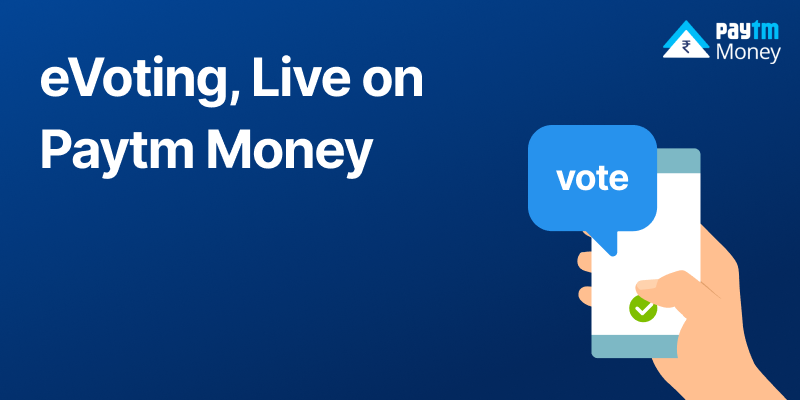eVoting, Live on Paytm Money!4 min read
India is a democracy, and we all know the importance of voting in a democracy. But did you know that your democratic rights also extend to companies? Let’s try and understand it with an example.
Let’s say your friend has a brilliant new business idea, but needs money to start his venture. You, being a good friend, help him out, and in return, you get a stake in the company (in technical terms, you are an equity investor in your friend’s venture). Now obviously, your friend is the expert in the venture he has started, so in day-to-day operational decisions, he doesn’t come and ask your permission.
But let’s say he now wants to do something new and different, in the same venture. As a shareholder, you would obviously have a say. Both of you can then discuss the merits of this new activity and then decide if you should proceed.
Large listed companies too, work the same way. Here, there are essentially 3 layers of decision making authority
- The management of the company – For the operational, day-to-day decisions of the company
- The Board of Directors – To oversee the management, and to approve major/strategic decisions
- The shareholders – For decisions beyond the board (ex – appointment of board of directors, remuneration of CEO etc etc)
The Board, which represents the shareholders is an additional layer here, as it might become operationally very difficult to go to the shareholders for every decision.
But shareholders do have a right, and have a right to vote on major decisions of the company. Just like your vote to elect the next MP, or MLA matters, your vote on important decisions of the company matter!
You own the company and you have a right to vote on important matters of the company. And just like elections, it is as much your duty, as it is your right to vote. (In case you doubt me on the duty part, SEBI mandates institutional investors to vote on all the resolutions in the companies they own, and the logic for their vote (yes/no) has to be maintained and audited)
Let’s take some examples of a few decisions that come to a shareholder vote.
- SIS Limited is asking the permission of the shareholders for appointing Ms. Rivoli Sinha as a non executive director of the company (The notice issued by the company has her credentials, her relationship with the promoters of the company, her shareholding etc so that you can make an informed decision)
- JK Tyre is seeking the vote of shareholders to appoint Mr. Subhrakant Panda as an independent director of the company. Again, the notice has details about Mr. Panda for you to decide if he can represent the rights of minority shareholders appropriately in the Board
- Muthoot Capital is seeking shareholders’ vote to approve the remuneration of its Managing director, for the current year, and for the next 3 years.
Now you might wonder how your vote would matter when there are large institutional investors and promoters who control the company. Well, you are mistaken. Your vote matters!
The example of Muthoot Capital is a wonderful one to show the power of shareholders.
On 5th September, Muthoot Capital proposed a resolution to fix the salary of its MD, Mr. Thomas Muthoot at Rs. 4.2 Cr for the current year and for the subsequent 3 years. This resolution was put to vote (postal ballot and e voting) on the 27th of September.
The public shareholders voted with their feet and rejected the resolution.
The company was now forced to lower the remuneration and request shareholders’ approval again.
Paytm Money understands the power of your vote and has made a simple process for you to exercise your vote, on important decisions in the companies you own!
Cast your eVote today at: https://www.paytmmoney.com/stocks/corporate-actions
How to vote on shareholder proposals via Paytm Money?
1. Enter Stocks Dashboard from the home screen

2. Click the tab “Account” on the bottom right

3. Scroll and click on the tab of Corporate actions mentioned as “Buyback, etc”

4. Click on “eVoting”

5. You’ll be redirected to the CDSL website for authorizing via OTP. Enter the OTP received in your registered mobile and email account

6. In case you are promoted for selecting ESP details like CDSL/NSDL etc close the window. Now you’ll be able to see a list of companies currently open for eVoting for which you are eligible. Click on eVoting against the company you’re interested to vote for

6. Proceed to read the proposal and cast your vote

Eligibility criteria for shareholders to e-vote on proposals?
Any shareholder which has stocks of the company as on record date is allowed to apply for eVoting during the eVoting commencement to closing period.
Disclaimer: Investment in the securities market are subject to market risks, read all the related documents carefully before investing.The securities are quoted as an example and not as a recommendation and such representations are not indicative of future results. Paytm Money Ltd SEBI Reg No. Broking – INZ000240532. NSE (90165), BSE(6707) Regd Office: 136, 1st Floor, Devika Tower, Nehru Place, Delhi – 110019. Refer www.paytmmoney.com/stocks/policies/terms#fno-dashboard for further information.




